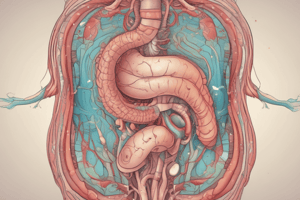Podcast
Questions and Answers
What is the primary function of the mucus produced in the upper two-thirds of the esophagus?
What is the primary function of the mucus produced in the upper two-thirds of the esophagus?
- Protection from gastric acid
- Secretion of digestive enzymes
- Regulation of gastric fluid composition
- Protection from excoriation by food (correct)
Which enzyme is involved in the activation of pepsinogen in the stomach?
Which enzyme is involved in the activation of pepsinogen in the stomach?
- Carbonic anhydrase
- Pepsin (correct)
- H+-K+ ATPase
- Gastrin
What is the role of the oxyntic or parietal cells in the gastric glands?
What is the role of the oxyntic or parietal cells in the gastric glands?
- Regulation of gastric blood flow
- Secretion of pepsinogen
- Production of intrinsic factor and HCl (correct)
- Production of mucus
Which nerve carries the efferent signals for salivation?
Which nerve carries the efferent signals for salivation?
What is the function of the gastrin produced by the G cells in the pyloric glands?
What is the function of the gastrin produced by the G cells in the pyloric glands?
Which of the following is NOT involved in the gastric acid secretion process?
Which of the following is NOT involved in the gastric acid secretion process?
What is the pH range at which pepsinogen is inactive?
What is the pH range at which pepsinogen is inactive?
Which of the following is a component of the gastric barrier?
Which of the following is a component of the gastric barrier?
What type of glands are responsible for the secretion of mucus in the GI system?
What type of glands are responsible for the secretion of mucus in the GI system?
Which of the following is a local stimulus for the secretion of mucus?
Which of the following is a local stimulus for the secretion of mucus?
What is the primary function of the Golgi complex in the secretion of organic substances?
What is the primary function of the Golgi complex in the secretion of organic substances?
Which of the following is a property of mucus?
Which of the following is a property of mucus?
What is the primary type of secretion in the parotid gland?
What is the primary type of secretion in the parotid gland?
What is the estimated daily production of saliva?
What is the estimated daily production of saliva?
What is the function of lysozyme in saliva?
What is the function of lysozyme in saliva?
Which of the following is not a component of saliva?
Which of the following is not a component of saliva?
What is the primary function of intrinsic factor in the stomach?
What is the primary function of intrinsic factor in the stomach?
What stimulates the release of histamine in the stomach?
What stimulates the release of histamine in the stomach?
What is the primary stimulus for pancreatic enzyme secretion during the intestinal phase?
What is the primary stimulus for pancreatic enzyme secretion during the intestinal phase?
What is the primary function of secretin in the pancreas?
What is the primary function of secretin in the pancreas?
What is the primary function of gastrin in the stomach?
What is the primary function of gastrin in the stomach?
What is the primary stimulus for the release of gastrin in the stomach?
What is the primary stimulus for the release of gastrin in the stomach?
What is the primary function of the vagus nerve in the regulation of gastric acid secretion?
What is the primary function of the vagus nerve in the regulation of gastric acid secretion?
What is the primary function of the enteric nervous system in the regulation of pancreatic enzyme secretion?
What is the primary function of the enteric nervous system in the regulation of pancreatic enzyme secretion?
What is the primary stimulus for the intestinal phase of gastric acid secretion?
What is the primary stimulus for the intestinal phase of gastric acid secretion?
What is the primary function of cholecystokinin (CCK) in the regulation of pancreatic enzyme secretion?
What is the primary function of cholecystokinin (CCK) in the regulation of pancreatic enzyme secretion?
Flashcards are hidden until you start studying
Study Notes
Gastric Secretions
- Intrinsic factor (parietal glands) necessary for vitamin B12 absorption, deficiency leads to pernicious anemia
- Mucus creates a 1 mm wide alkaline barrier
- Gastrin (pyloric glands) stimulates acid secretion, releases histamine, and is controlled by gastrin and the enteric nervous system
Control of Gastric Secretions
- Stimulation of acid secretion:
- Enterochromaffin-like cells (ECL cells) release histamine
- Controlled by gastrin and the enteric nervous system
- Stimulation of pepsinogen secretion:
- Acetylcholine from vagus or enteric nervous system
- Response to acid in the stomach
- Inhibition of gastric secretion:
- Reverse enterogastric reflex by enteric nervous system and extrinsic sympathetic
- Hormonal inhibition by secretin, GIP, VIP, and somatostatin
Phases of Gastric Secretions
- Cephalic phase (30% secretion):
- Neurogenic upper signals that respond to stimuli
- Conducted by the vagus nerves from the dorsal motor nuclei
- Gastric phase (60% secretion):
- Extrinsic long vasovagal reflex to the brain
- Local enteric reflexes
- Gastrin mechanism
- Intestinal phase (10% secretion):
- Small secretion caused by food in the duodenum
- Probably mediated by gastrin
Pancreatic Secretions
- Enzymes (Acini):
- Amylase
- Proteases (trypsin, chymotrypsin, procarboxypeptidase)
- Lipases (pancreatic lipase, cholesterol esterase, phospholipase)
- Bicarbonate and water (Ducts)
Regulation of Pancreatic Secretions
- Acetylcholine:
- Stimulates the acini
- From parasympathetic and enteric nervous system
- Cholecystokinin:
- Stimulates the acini
- Released by I cells in the duodenal and proximal jejunal mucosa in response to proteoses, peptones, and long-chain fatty acids
- Secretine:
- Stimulates the ducts to produce HCO3+
- Released by S cells in the duodenal and proximal jejunal mucosa
- Increases pH to 7.0-8.0
Phases of Pancreatic Secretion
- Cephalic and gastric phases:
- Conducted by parasympathetic system
- Initial and limited production of enzymes at the acini
- Intestinal phase:
- Production of secretin and CCK by chyme at the duodenum
- Copious production of pancreatic juice
Bile Components
- Water
- Bile salts
- Bilirubin
- Cholesterol
- Fatty acids
- Lecithin
- Na+, K+, Ca++, Cl-, HCO3-
Regulation of Bile Excretion
- Cholecystokinin:
- Stimulates the contractions of the gallbladder and opening of the Sphincter of Oddi
- Secretine:
- Stimulates the duct cells to produce water and sodium bicarbonate
- Acetylcholine:
- Stimulates the gallbladder contractions
- From parasympathetic and enteric nervous system
Small Intestine Secretions
- Brunner's glands:
- Alkaline mucus
- Stimulated by tactile or irritating stimuli, vagal stimulation, secretin, and sympathetic inhibition
- Lieberkühn crypts:
- Globet cells
- Mucus
- Enterocytes
- Water and electrolytes (1800 ml/d)
- Digestive enzymes (peptidases, sucrase, maltase, lactase, intestinal lipase)
Colonic Secretions
- Lieberkühn crypts:
- Globet cells
- Mucus
- Enterocytes
- Water and electrolytes
- Regulation:
- Parasympathetic and enteric nervous system
- Tactile stimulation
Salivary Secretions
- Parotid glands:
- Serous secretion
- Ptyalin (amylase)
- Submandibular glands:
- Mix secretion
- Mucin
- Sublingual glands:
- Mix secretion
- Water
- Buccal glands:
- Mucus
- Composition:
- Water
- Electrolytes (low ClNa, high KHCO3)
- Antibodies
- Proteolytic enzymes (lysozyme)
- Thiocyanate ions
Esophageal Secretions
- Mucus:
- Upper two-thirds: simple mucous glands
- Lower third: compound mucous glands
Gastric Secretions
- Glands:
- Mucous cells
- Tubular glands
- Oxyntic or gastric glands
- Peptic or chief cells
- Acid secretion:
- Enzymes involved (H+-K+ ATPase, carbonic anhydrase, Na+-K+ ATPase, anion exchanger)
- Gastric fluid composition (ClH, ClK, ClNa)
- Gastric barrier (tight intercellular junctions, mucus)
Other Gastric Secretions
- Pepsinogens (peptic glands):
- Inactive at pH > 5
- Activated in acid environment
Types of Secretory Glands
- Unicellular glands:
- Mucous (goblet) glands
- Tubular glands
- Multicellular glands:
- Crypts of Lieberkühn
- Complex glands (salivary glands, pancreas, liver)
Stimulation of Secretory Glands
- Local stimulation:
- Direct contact
- Enteric nervous system
- Autonomic innervation:
- Parasympathetic stimulation
- Sympathetic dual effect (by reduction of blood supply)
Secretions
- Organic substances:
- Endoplasmic reticulum
- Golgi complex
- Vesicles
- Mucus:
- Composition (water, electrolytes, polysaccharides)
- Properties (adherent, compact, slippy, resistant, amphoteric)
Studying That Suits You
Use AI to generate personalized quizzes and flashcards to suit your learning preferences.



